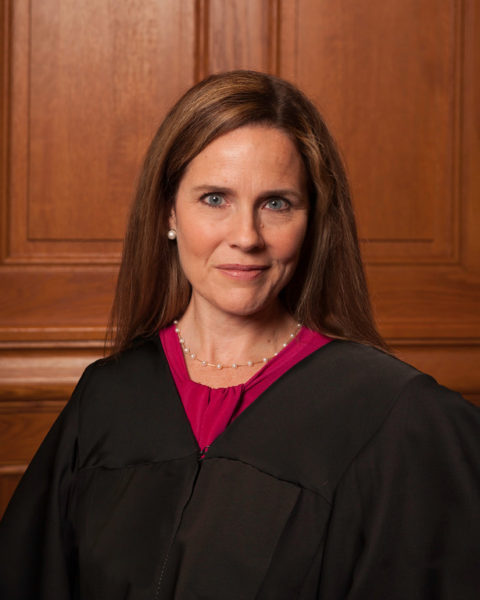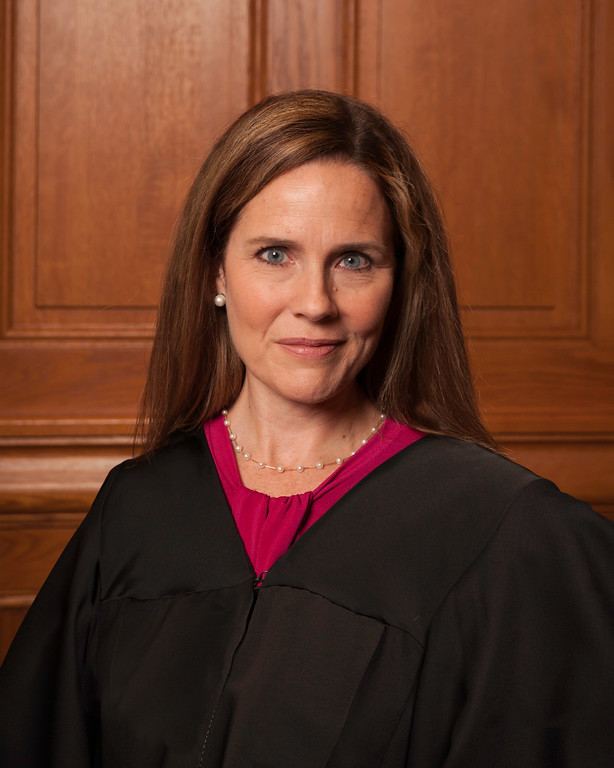
Amy Coney Barrett, a long-term academic, appeals court judge and mother of seven was the hot favorite for the Supreme Court seat.
Donald Trump – who as sitting president gets to select nominees – reportedly once said he was “saving her” for this moment: when elderly Justice Ruth Bader Ginsburg died and a vacancy on the nine-member court arose.
It took President Trump just over a week to fast-track the 48-year-old conservative intellectual into the wings. This is his chance to tip the court make-up even further to the right ahead of the presidential election, when he could lose power.
Amy Coney Barrett’s record on gun rights and immigration cases imply she would be as reliable a vote on the right of the court, as the Notorious RBG was on the left, according to Jonathan Turley, a professor of law at George Washington University.
Judge Barrett’s vote, alongside a conservative majority, could make the difference for decades ahead, especially on divisive issues such as abortion rights and the Affordable Care Act (the Obama-era health insurance provider).
Her legal opinions and remarks on abortion and gay marriage have made her popular with the religious right, but earned vehement opposition from liberals.
However, as a devout Catholic, Amy Coney Barrett has repeatedly insisted her faith does not compromise her work.
Amy Coney Barrett is President Trump’s Nomination for Supreme Court
Notorious RBG: Supreme Court Judge Ruth Bader Ginsburg Dies Aged 87
Senate Confirms Brett Kavanaugh as Supreme Court Judge
Donald Trump Nominates Neil Gorsuch for Supreme Court
Amy Coney Barrett lives in South Bend, Indiana, with her husband, Jesse, a former federal prosecutor who is now with a private firm. The couple have seven children, including two adopted from Haiti. She is the oldest of seven children herself.
Known for her sharp intellect, Amy Coney Barrett studied at the University of Notre Dame’s Law School, graduating first in her class, and was a clerk to Justice Antonin Scalia, who, in her words, was the “staunchest conservative” on the SCOTUS at the time.
Like her mentor Scalia, Amy Coney Barrett is an originalist, which is a belief that judges should attempt to interpret the words of the Constitution as the authors intended when they were written.
Many liberals oppose that strict approach, saying there must be scope for moving with the times.
Amy Coney Barrett has spent much of her career as a professor at her alma mater, Notre Dame, where she was voted professor of the year multiple times.
She was selected by President Trump to serve as a federal appeals court judge in 2017, sitting on the Seventh Circuit, based in Chicago. She regularly commutes to the court from her home – more than an hour and half away.
Amy Coney Barett’s confirmation hearing for the appeals court seat featured a now-infamous encounter with Senator Dianne Feinstein, who voiced concerns about how her faith could affect her thinking on the law. Defiant Catholics adopted the phrase as a tongue-in-cheek slogan on mugs.
Judge Barrett has defended herself on multiple occasions.
“I would stress that my personal church affiliation or my religious belief would not bear in the discharge of my duties as a judge,” she once said.
LGBTQ advocacy group Human Rights Campaign has voiced strong opposition to Barrett’s confirmation, declaring her ”an absolute threat to LGBTQ rights”.
The Guttmacher Institute, a pro-choice research organization, declined comment on Judge Barrett specifically, but said appointing any new conservative Supreme Court justice would “be devastating for sexual and reproductive health and rights”.
To secure the position on the Supreme Court – a lifelong job – Amy Coney Barrett will still have to pass a grueling confirmation hearing, where Democratic senators are likely to take a tough line, bringing up many of their voters’ concerns.
